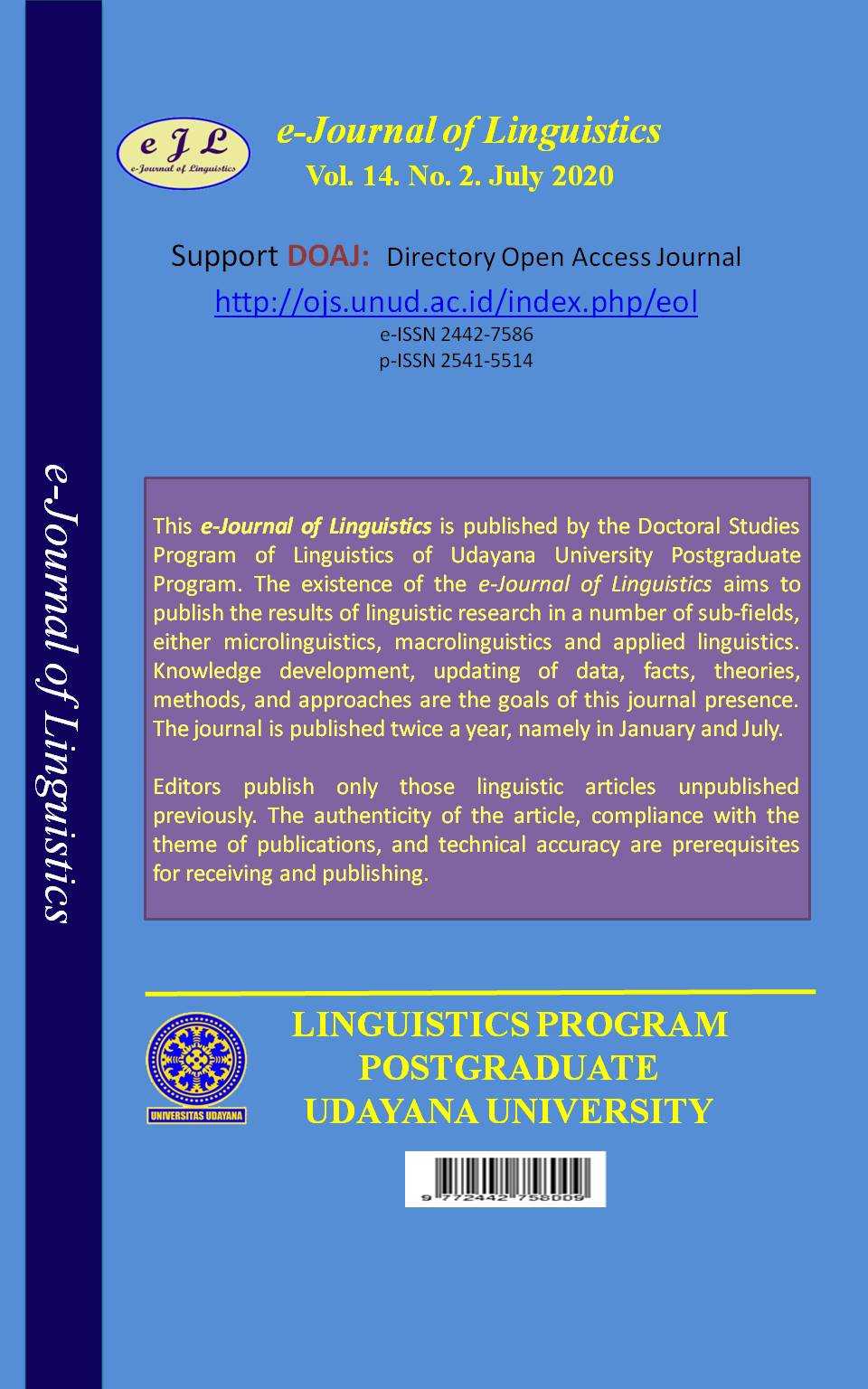English Reading Habit of Students With Different L1 Reading Habit, L2 Reading Proficiency, and Reading Attitude
Abstract
Second language reading is affected by reading habit of first language, the reading proficiency, the strategies of reading, and reading attitude (Sundari, 2013). The questions lies in this study are (1) how does English reading habit of students with different L1 reading habit, L2 reading proficiency, and reading attitude? (2) And what is the factor mostly affected the English reading habit? This is a qualitative-quantitative research, this is a qualitative research for its purpose to describe the English habit, and this study is also a quantitative research for its purpose to find the most factors affected the English reading habit by applying the formula of correlation to see the highest coefficient correlation. The instruments of this study are two questionnaires of (1) reading attitude by M.N. Gomleksiz (2004) and (2) L2 reading habit by Ro Eunseok and Alice (2014) which are administered to 23 students. The result of this study are: (1) English reading habits of the subjects found out various and different due to the combination of the three factors collaborated, from 23 students there are 11 of them are in low English reading habit, 8 of them are in moderate English reading habit, and 4 of them are in high English reading habit. (2) Though, L1 reading habit is mostly low but L2 reading proficiency is the factor mostly affected English reading habit since its coefficient correlation is the highest 0,76.
Downloads
References
Annamalai, S. & Muniandy, B. 2013. Reading Habit and Attitude Among Malaysian Politechnic Students. International Online Journal of Educational Sciences. Vol 5 (1), 32-41. Malaysia.
Bastug, M. 2014. The Structural Relationship of Reading Attitude, Reading Comprehension and Academic Achievement. International J. Soc. Sci. & Education Vol.4 Issue 4, ISSN: 2223-4934 E and 2227-393X Print
Chotitham, Sareeya., Wongwanich, Suwimon. 2013. The Reading Attitude Measurement for Enhancing Elementary School Students’ Achievement. 5th World Conference on Educational Sciences. Bangkok-Thailang. ISSN: 1877-0428
Cynthia, P.T. 2004. An Evaluation of Students Reading Attitude: Does Ability affect Attitude? A Research. University of North Carolina at Wilmington.
Fishbein, M., & Ajzen, I. (1976). Belief, attitude, intention, and behavior: An introduction to
theory and research. Reading, MA: Addison-Wesley. In Ro & Chen. 2014. Pleasure reading behavior and attitude of non-academic ESL students. Reading in a Foreign Language. Volume 26, No. 1 ISSN 1539-0578 pp. 49–72.
Ghazali, Siti N et al. 2009. ESL Students’ Attitude towards Texts and Teaching Methods Used in Literature Classes. Ccsnet Journal. Vol 2 No. 4. Malaysia.
Gomleksiz, M.N. (2004). Kitap Okuma Aliskanligina Iliskin Bir Tutum Olceginin Gecerlik ve Guvenisligi. Firat Universitesi Sosyal Bilimler Dergisi, 2(14), 185-195. In Gokhan, BAS. (2012). Reading Attitudes of High Schools Students: An Analysis From Different Variables. International Journal on New Trends in Education and Their Implications. Vol.3 (2) ISSN 1309-6249.
Kear, D.J., McKenna, M.C., & Ellsworth, R.A. (1995). Children's attitudes toward reading: A national survey. Reading Research Quarterly, 30(4), 934-955. In Bastug, M. 2014. The Structural Relationship of Reading Attitude, Reading Comprehension, and Academic Achievement. International J. Soc. Sci. & Education 2014 Vol.4 Issue 4, ISSN: 2223-4934 E and 2227-393X Print
Kear, D.J., McKenna, M.C., & Ellsworth, R.A. (1995). Children's attitudes toward reading: A national survey. Reading Research Quarterly, 30(4), 934-955. In Parker, Cynthia. T. 2004. Thesis: An Evaluation of Students Reading Attitude, Does Ability affect Attitude?. University of North California at Wilmington.
Cohen, L. (2007). Research Method in Education. New York; Routledge Publication.
Marpaung, M. 2011. Reading Comprehension Processes of Students with Different Personality. Unimed Press.
MARPAUNG, Magdalena; SIHOMBING, Humiras Betty Marlina. Attitude Towards Reading of English Department Students in Darma Agung University: A Survey based on different personal attribute and environmental factors. JURNAL LITTERA: FAKULTAS SASTRA DARMA AGUNG, [S.l.], v. 1, n. 1, p. 46 - 58, june 2020. ISSN 2089-0273.
MARPAUNG, Magdalena. Cognitive Model of Writing of Students taught by Text-oriented Teaching and Research. JURNAL LITTERA: FAKULTAS SASTRA DARMA AGUNG. June 2019. ISSN 2089-0273.
MARPAUNG, Magdalena; SIHOMBING, Humiras Betty Marlina. Contextual Factors in Guessing Words Meaning in Reading by the EFL Learners. JURNAL LITTERA: FAKULTAS SASTRA DARMA AGUNG. Oktober 2019. ISSN 2089-0273
McKenna, M.C., Kear, D.J., & Ellsworth, R.A. (1996). Children’s attitudes toward reading: A national survey. Reading Research Quarterly, 30 (4), 934–955. In Annamalai, S. & Muniandy, B. 2013. Reading Habit and Attitude Among Malaysian Politechnic Students. International Online Journal of Educational Sciences. Vol 5 (1), 32-41. Malaysia
Ro & Chen. 2014. Pleasure reading behavior and attitude of non-academic ESL students. Reading in a Foreign Language. Volume 26, No. 1 ISSN 1539-0578 pp. 49–72.
Sainsbury, M. ( 2004). Children's attitudes to reading. Education Journa,l (79), 15-15. In Bastug, M. 2014. The Structural Relationship of Reading Attitude, Reading Comprehension and Academic Achievement. International J. Soc. Sci. & Education Vol.4 Issue 4, ISSN: 2223-4934 E and 2227-393X Print
Sundari, Hanna. 2013. EFL Adult Learners Reading Attitude and Reading Comprehension: a Preliminary Study. Conference Paper. Research Gate.
Wilie, Camille. 2016. Individual Differences in Reading Comprehension: A componential approach to eighth graders’ expository text comprehension. A research report: LOT Trans 10. ISBN: 978-94-6093-220-5.

This work is licensed under a Creative Commons Attribution 4.0 International License











